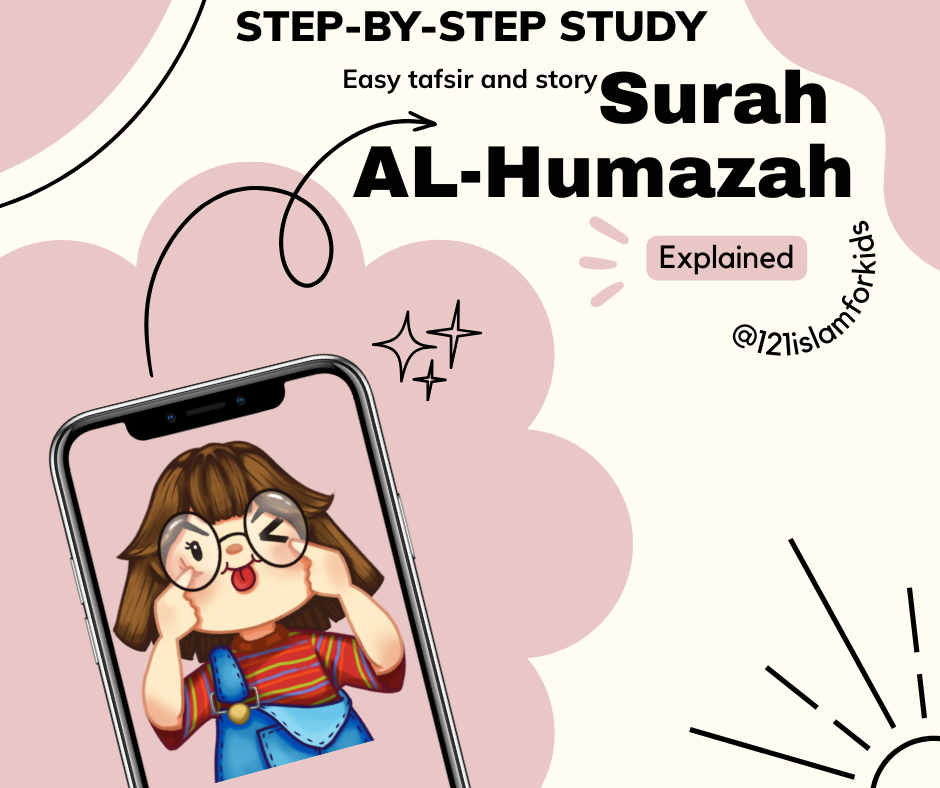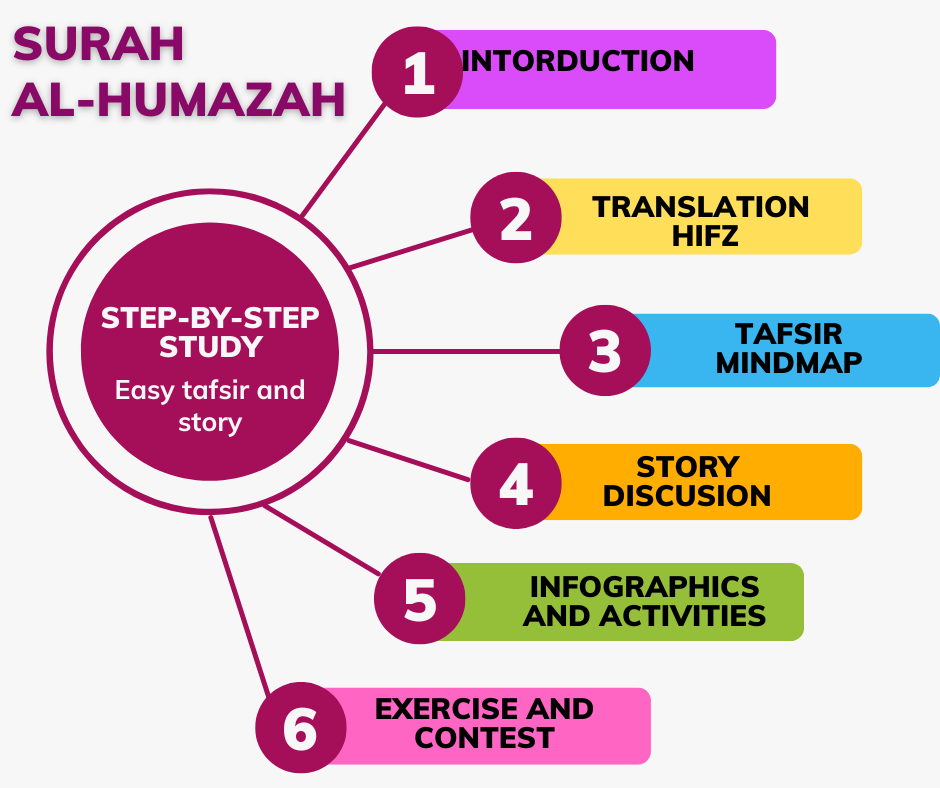Surah Humazah (Chapter 104) of the Quran in Arabic along with English translation and word-to-word meanings and various activities:

Table of Contents
Surah Humazah (Chapter 104)
Arabic:
بِسْمِ اللَّهِ الرَّحْمَٰنِ الرَّحِيمِ
وَيْلٌ لِكُلِّ هُمَزَةٍ لُمَزَةٍ
الَّذِي جَمَعَ مَالًا وَعَدَّدَهُ
يَحْسَبُ أَنَّ مَالَهُ أَخْلَدَهُ
كَلَّا ۖ لَيُنبَذَنَّ فِي الْحُطَمَةِ
وَمَا أَدْرَاكَ مَا الْحُطَمَةُ
نَارُ اللَّهِ الْمُوقَدَةُ
الَّتِي تَطَّلِعُ عَلَى الْأَفْئِدَةِ
إِنَّهَا عَلَيْهِم مُّؤْصَدَةٌ فِي عَمَدٍ مُّمَدَّدَةٍ
English Translation:
- Woe to every scorner and mocker
- Who collects wealth and [continuously] counts it.
- He thinks that his wealth will make him immortal.
- No! He will surely be thrown into the Crusher.
- And what can make you know what is the Crusher?
- It is the fire of Allah, [eternally] fueled,
- Which mounts directed at the hearts.
- Indeed, it [i.e., Hellfire] will be closed down upon them
- In extended columns.
Step-by-Step teaching method
Teaching Surah Al-Humazah (Chapter 104) comprehensively can be done through a structured step-by-step approach that incorporates various methods to engage learners. Here’s a suggested plan:
1. Introduction:
- Begin by introducing the Surah’s name, Al-Humazah, and its significance.
- Discuss the theme of the Surah, which focuses on the consequences of backbiting, slander, and arrogance.
2. Word Meaning and Tafsir:
- Break down each verse, explaining the meanings of keywords and phrases.
- Use resources like Ibn Kathir’s Tafsir to provide deeper insights into the context and interpretation of the Surah.
- Encourage students to ask questions and engage in discussions to enhance their understanding.
3. Memorization:
- Provide techniques for memorizing the Surah, such as repetition, visualization, and listening to recitations.
- Break the Surah into smaller sections for easier memorization.
- Encourage regular practice and revision to reinforce memorization.
4. Infographics and Mindmaps:
- Create visually appealing infographics that summarize the key themes and messages of each verse.
- Use mind maps to organize the main ideas and connections within the Surah, aiding in comprehension and retention.
5. Storytelling:
- Narrate stories or anecdotes related to the theme of the Surah to make it more relatable and memorable.
- Highlight examples from the life of Prophet Muhammad (peace be upon him) or other historical incidents that illustrate the consequences of backbiting and arrogance.
6. Activities:
- Role-playing: Divide students into groups and assign roles to act out scenarios involving backbiting and its consequences, followed by discussions on alternative positive behaviors.
- Art/crafts projects: Have students create artwork or posters depicting the Surah’s message using symbols and imagery. Like making a heart with wounds and stitching it or bandaging it.
- Writing exercises: Ask students to write reflections or journal entries on how they feel when they get bad remarks. make a list of the sentences or words, you never like to hear for you.
7. Quiz and Exercises:
- Create quizzes or worksheets to assess students’ understanding of the Surah’s content, including its meanings and lessons.
- Incorporate interactive exercises such as fill-in-the-blank, matching, or true/false questions.
- Provide feedback and review any areas where students may need clarification or additional support.
By following this structured approach, learners can gain a comprehensive understanding of Surah Al-Humazah while also developing their memorization skills, critical thinking abilities, and moral awareness.
Let’s start Surah Al-Humazah Step-by-step study

1.Intorduction
Surah Al-Humazah was revealed in Makkah during the early period of Prophet Muhammad’s mission. Its revelation came as a response to the widespread mockery, slander, and arrogance prevalent among the Quraysh, particularly towards the Prophet and his followers.
According to Tafsir and Seerah books, some of the prominent figures in Makkah who were known for their mockery and slander against the Prophet and the early Muslims included:
- Abu Lahab: He was the uncle of Prophet Muhammad and one of his staunchest opponents. Abu Lahab and his wife Umm Jamil were notorious for their hostility towards Islam and their relentless persecution of the Prophet and his followers.
- Abu Jahl (Amr ibn Hisham): He was one of the leaders of the Quraysh and a fierce enemy of Islam. Abu Jahl was known for his arrogance, hostility, and relentless opposition to the Prophet and his message.
- Muhammad ibn Ishaaq said: We continue to hear that this surah was revealed about Umayyah ibn Khalaf: He was a wealthy and influential figure in Makkah who openly opposed Islam and mistreated the early Muslims. Umayyah was known for his cruelty and disdain towards the Prophet and his followers.
- ‘Ata and Al-Kalbi said: This surah was revealed about Al-Akhnas ibn Shariq, who used to criticize people and gossip about them, especially the Messenger of Allah.
- Muqatil said: This surah was revealed about Al-Walid ibn Al-Mughira, who used to gossip about the Messenger of Allah in his absence and mock him to his face.
- Ibn Ashour said: This surah encompasses all polytheists who engaged in this act, whether their names are known or not.”
These individuals, along with others from the Quraysh tribe, actively engaged in mocking, ridiculing, and slandering the Prophet and his followers, seeking to discredit Islam and undermine its message. The Prophet Muhammad (peace be upon him) continued his mission undeterred, guided by the light of truth and compassion, while those who had opposed him were left to face the consequences of their deeds in the Hereafter Surah Al-Humazah was revealed to condemn their behavior and warn them of the consequences of their actions in the Hereafter.
2. Word-by-Word meaning and translation
بِسْمِ اللَّهِ الرَّحْمَٰنِ الرَّحِيمِ
In the name of Allah, the Entirely Merciful, the Especially Merciful.
Verse 1:
Arabic: وَيْلٌ لِكُلِّ هُمَزَةٍ لُمَزَةٍ
English: Woe to every scorner and mocker
- يْلٌ (Woe)
- لِكُلِّ (to every)
- هُمَزَةٍ (scorner)
- لُمَزَةٍ (mocker)
Verse 2:
Arabic: الَّذِي جَمَعَ مَالًا وَعَدَّدَهُ
English: Who collects wealth and [continuously] counts it.
- الَّذِي (Who)
- جَمَعَ (collects)
- مَالًا (wealth)
- وَعَدَّدَهُ (and [continuously] counts it)
Verse 3:
Arabic: يَحْسَبُ أَنَّ مَالَهُ أَخْلَدَهُ
English: He thinks that his wealth will make him immortal.
- يَحْسَبُ (He thinks)
- أَنَّ (that)
- مَالَهُ (his wealth)
- أَخْلَدَهُ (will make him immortal)
Verse 4:
Arabic: كَلَّا ۖ لَيُنبَذَنَّ فِي الْحُطَمَةِ
English: No! He will surely be thrown into the Crusher.
- كَلَّا (No!)
- لَيُنبَذَنَّ (He will surely be thrown)
- فِي (into)
- الْحُطَمَةِ (the Crusher)
Verse 5:
Arabic: وَمَا أَدْرَاكَ مَا الْحُطَمَةُ
English: And what can make you know what is the Crusher?
- وَمَا (And what)
- أَدْرَاكَ (can make you know)
- مَا (what)
- الْحُطَمَةُ (is the Crusher)
Verse 6:
Arabic: نَارُ اللَّهِ الْمُوقَدَةُ
English: It is the fire of Allah, [eternally] fueled,
- نَارُ (fire of)
- اللَّهِ (Allah)
- الْمُوقَدَةُ (eternally fueled)
Verse 7:
Arabic: الَّتِي تَطَّلِعُ عَلَى الْأَفْئِدَةِ
English: Which mounts directed at the hearts.
- الَّتِي (Which)
- تَطَّلِعُ (mounts directed)
- عَلَى (at)
- الْأَفْئِدَةِ (the hearts)
Verse 8:
Arabic: إِنَّهَا عَلَيْهِم مُّؤْصَدَةٌ
English: Indeed, it [i.e., Hellfire] will be closed down upon them
- إِنَّهَا (Indeed, it)
- عَلَيْهِم (upon them)
- مُّؤْصَدَةٌ (will be closed down)
Verse 9:
Arabic: فِي عَمَدٍ مُّمَدَّدَةٍ
English: In extended columns.
- فِي (in)
- عَمَدٍ (columns)
- مُّمَدَّدَةٍ (extended)
3. Easy Tafsir of surah humazah
You’re correct, the Bismillah is not included in Surah Al-Humazah (Chapter 104) of the Quran. Here’s a detailed Tafsir of Surah Al-Humazah according to Ibn Kathir’s interpretation:
Verse 1: The word “Woe” is a severe warning from Allah to those who habitually engage in backbiting and slander. They are constantly looking for faults in others to mock and ridicule them.
“Woe” is a warning of punishment for those who habitually ridicule and mock others. This indicates that mocking and making fun of people is a serious offense in the sight of Allah. Imagine if you worked hard on a drawing and someone laughed at it. That’s not nice, right?
Verse 2: Allah describes the habit of such people, who amass wealth through any means possible and constantly count and hoard it as if their entire existence revolves around their wealth.
Verse 3: These individuals have the false belief that their wealth will grant them eternal life and happiness as if they will never face any consequences for their actions.
This verse talks about people who love to collect money and keep counting it all the time, thinking it’s the most important thing. It’s like someone who collects a lot of toys but never shares them with their friends.
Verse 4: Allah refutes this false belief with a resolute “No!” They will not live forever in luxury; rather, they will be cast into the Crusher, a place of severe punishment in the Hereafter.
Such a person believes that their wealth will make them immortal, showing their arrogance and false sense of security in their riches. But that’s not true because life is about more than just money. Even if you have lots of toys, you still need friends to play with.
Verse 5: The severity of this punishment is emphasized, prompting reflection on its terrifying nature.
This false belief is shattered by the reality of death and the Hereafter. They will be thrown into a crushing punishment Keep in mind, punishment is not just because of a lot of money or more toys. But it’s because of your arrogant behavior and showing off and denying to share it with others. It’s like when you build a sandcastle at the beach and then a big wave comes and washes it away.
Just suppose you have a variety of dishes to eat. And someone in your neighbor is very hungry. The aroma of food is spread. But instead of sharing food, you are being rude to him. How would you feel if it happened to you?
Verse 6: The Crusher is described as a fire kindled by Allah Himself, symbolizing the intense and unrelenting nature of the punishment awaiting the wrongdoers.
Verse 7: This fire will leap onto the hearts of the offenders, causing them unbearable agony and distress.
This fire burns so hot that it reaches right into people’s hearts, causing them pain and sadness. As they cause pain and sadness in the worldly life.
Verse 8: They will be trapped in this torment, unable to escape or find any relief from its heat and pain.
Verse 9: They will be confined in long columns in Hell, indicating the severity and permanence of their punishment, with no hope of reprieve.
Once they’re in this place, there’s no escaping it. It’s like being stuck in a room with no doors or windows. They will be stuck there in long lines, waiting and unable to leave. It’s like waiting in line for a ride at an amusement park, but this ride never ends, and it’s not fun at all.
In summary, Surah Al-Humazah serves as a stern warning against the sins of backbiting, slander, and arrogance, highlighting the severe consequences they entail in the Hereafter. It reminds believers to be mindful of their words and actions and to avoid harming others with their tongues or through their pursuit of worldly wealth.
4. Infographics/ Hifz(Memorization)
After covering two or three verses. children would be asked to make infographics of the verses. My first Quran with pictures has good infographics. Children can copy them or add their creativity and explain the theme of the verse with the help of drawing objects. (Please visit gallary to see the pictures made by our students.) During this children will start to memorise the verses by heart. We have verse-by-verse tajweed recitation videos. Children will practice and memorize with the help of these videos. (visit the youtube playlist for Tajweed recitation videos)
5. Mindmap
Here is a mindmap of the Surah Humazah
Surah Al-Humaza
Meaning
The mockers
Mindmap
KEY FACTS!!
Surah Al-Humazah
It is in juzz 30
It has 9 verses.
It is Makki Surah..
Three topics have been discussed in this Surah
Warning to mockers
Vanity of wealth
Punishments of Jahanam
V. 1 warning to mockers.
Woe to the one woe goal is to speak about other people.
ONE OF THE ETTIQUETTES OF ISLAM IS TO MIND YOUR BUN BASINESS. QURAN CRITICISES THE ONE WHO IS ALWAYS GOSSIPING
Verse 2-5
Vanity of wealth
He, who counts his own money and he thinks that his money will cause him to live forever.
THE PEOPLE WHO THINK LIFE IS PURELY TO A MALS HEALTH THEY DON’T THINK ABOUT DEATH
Verse 4-9:
Punishment of Jahanam.
That person will be thrown into the crushing fire.
Points to remember:.
Never look down on anyone..
Mocking is not allowed by anyone.
Keep a balance between earning and spending money.
Do not count money with greed.
Remember it!!!
If we will mock others and hurt others, hellfire will burn our hearts, as we were hurting others by mocking.
Let’s make an intention.
No Mocking
No gossips
No greed for more
We need to pray to seek the protection of Allah
Let’s pray.
Dua for evil and protection from shaitan
أَعُوذُ بِكَلِمَاتِ اللهِ التَّامَّةِ مِنْ شَرِّ مَا خَلَقَ
Transliteration
The dua is transliterated as A’udhu bi kalimat-illah il-tammati min sharri ma khalaq.
Meaning in English
The meaning of the dua for protection from the evil eye is I seek refuge in the perfect words of Allah from the evil of that which He has created.
6. Story of surah humazah:
There are two stories to explain this surah. The first story is the revelation story of the surah. This story can help students, why this surah was revealed. And how mocking and slandering and greedy habits of disbelievers of the Makkah were answered.
2nd story is crafted for children. The theme of the story is How mocking and greed of more can leave us alone. You can read this story at our site or watch the video of the story. The Link is down in resources.
Exercise based on Surah Al-Humazah:
Quiz:
- What is the theme of Surah Al-Humazah?
a) Mercy and forgiveness
b) Backbiting and slander
c) Gratitude and generosity - What does “Woe” in verse 2 signify?
a) Happiness
b) Warning
c) Comfort - In verse 3, what do people mentioned collect excessively?
a) Toys
b) Wealth
c) Knowledge - What false belief do the wrongdoers have in verse 4?
a) Their wealth will make them immortal
b) Their friends will protect them
c) They will never face consequences - What is the Crusher mentioned in verse 5?
a) A tool for building
b) A punishment in the Hereafter
c) A type of food
Exercise:
- Memorize the Arabic text of Surah Al-Humazah.
- Write a summary of the Surah’s message in your own words.
- Reflect on a time when you may have engaged in backbiting or gossip. Write about how you felt afterward and what you learned from the experience.
- Create an infographic or poster illustrating the consequences of backbiting and slander mentioned in the Surah.
- Role-play a scenario where someone is being mocked or ridiculed. Discuss alternative ways the situation could have been handled with kindness and respect.
- Write a short story or poem inspired by the theme of Surah Al-Humazah.
- Discuss with a friend or family member how you can apply the lessons from Surah Al-Humazah in your daily life to avoid backbiting and arrogance.
(FAQs) about Surah Al-Humazah along with short answers:
1. What is the main theme of Surah Al-Humazah?
- The main theme is the consequences of backbiting, slander, and arrogance.
2. What does “Woe” signify in verse 2?
- “Woe” signifies a severe warning or impending punishment from Allah.
3. What do people mentioned in verse 3 collect excessively?
- They collect wealth excessively and count it repeatedly.
4. What false belief do the wrongdoers have in verse 4?
- They believe that their wealth will make them immortal and protect them from any harm.
5. What is the “Crusher” mentioned in verse 5?
- The Crusher refers to a severe punishment in the Hereafter for those who engage in wrongdoing.
6. What is the punishment described in verse 7?
- The punishment described is like a fire kindled by Allah Himself, symbolizing intense and relentless torment.
7. How can we apply the lessons from Surah Al-Humazah in our daily lives?
- We can avoid backbiting, slander, and arrogance, and instead strive to be kind, respectful, and considerate towards others.
Resources and Links
Story of Surah Humazah Video
Books (Shop)
Islamic education By Molvi Abdula Aziz Grade7

